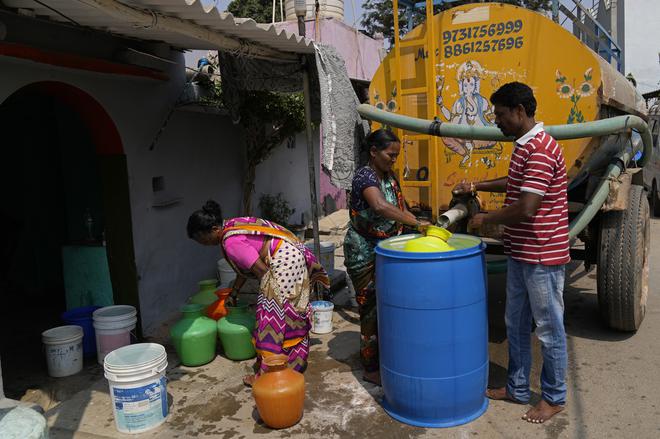As the water shortage in Bengaluru continues, the citizens and activists are now blaming the Bangalore Water Supply and Sewerage Board (BWSSB) and Karnataka Ground Water Authority (KGWA) for the mismanagement despite there were warnings about water woes well in advance.
The BWSSB on March 7 issued a notification ordering a ban on potable water for non-essential purposes under sections 33 and 34 of BWSSB Act 1964. But this came only when the crisis reached its peak.
No lessons learnt
Ramprasad, from Friends of Lakes, speaking to The Hindu, said every four years the city reels under water problems and the previous one was in 2019. “It is unfortunate that the BWSSB, Bruhat Bengaluru Mahanagara Palike (BBMP) and KGWA have not learnt any lessons from the mistakes. The agencies had warning about this crisis in advance and it did not act,” he said.
The BWSSB act clearly states that drinking water must not be utilised for non essential purposes like washing cars, watering gardens, construction work, road laying etc. For this treated water or recycled water should be used. If this was implemented there would had been sufficient water not just for 1.3 crore population but to cater to 2 crore people. On the other hand, rejuvenation of lakes has stopped flow of water to water bodies due to which ground water has further receded, Ramprasad pointed out.

Water for luxury
“The BWSSB is also supplying more than required water for apartments even during the crisis. As per the international standards, per person everyday water requirement is 135 litres. But there are instances of BWSSB supplying up to 280 litres. Anything above 135 litres means the supplied water is being consumed for luxury or non-essential purposes. On the other hand 35% of Cauvery water meant for the city is wasted in leakages. This means of the 1400 million litres per day (MLD) that Bengaluru draws, 500 MLD is lost as leakage and nearly 150 MLD allocated for industries, 750 MLD is left for the people to consume everyday. This leakage has to be fixed,” he said.
Sandeep Anirudhan, Convenor, Citizens’ Agenda for Bengaluru, said the KGWA’s failure to check digging of illegal borewells has also contributed to the crisis. “Despite our campaign against illegal borewells, the problem still persists. Under the Karnataka Ground Water Authority Act, 1999, a person who wants to dig borewell has to secure permission. But this is not implemented on the ground. The collective failure of KGWA, BWSSB, Wetland Authority created this crisis which could had been averted,” Anirudhan said.
Loss of wetland
He further said the loss of wetland, which is sink hole for water, is causing ground water depletion and the government should take the officials in the Wetland Authority to task on this,
Srinivas Reddy, a member of the Bengaluru Navanirmana Party, said when the water crisis ends in June, the BWSSB will stop the implementation of the ban and the problem will resurface yet again. “This is cyclic. The BWSSB has also failed to stop usage of borewell water by the industries and it took a severe crisis for the water board to promote usage of treated water,” he said.



.png?w=600)



